
When God reached down from heaven with the best gift of all, people near and far took notice. Shepherds quaked. Angels sang. Mary pondered. And scholars from the east followed his star, bright and shining, leading them toward Jerusalem.
The mission of the Magi is our mission now: seek him, find him, worship him.
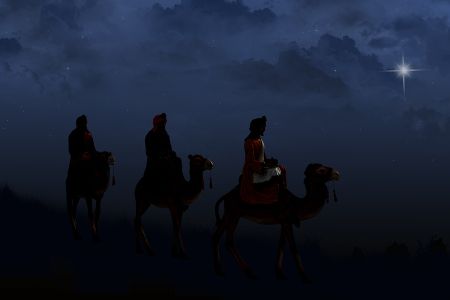
Read Chapter Seven: And Our Eyes at Last Shall See Him
Read Matthew 2:1-12 and Luke 2:21–35
Most deluxe nativity sets include three wise men—no more, no less. Dressed in richly embroidered robes of burgundy and blue, these holy action figures bear gifts of gold, frankincense, and myrrh for the newborn king of the Jews.
When the real Magi of old appeared, searching for the Christ child, King Herod “became very agitated” (Matthew 2:3), and no wonder. Wasn’t he the king of Israel, by Rome’s decree?
Then the chief priests quoted the prophet Micah, telling Herod that out of Bethlehem would come “one who will be ruler over Israel” (Micah 2:5).
Trouble with a capital T, and in David’s hometown too.
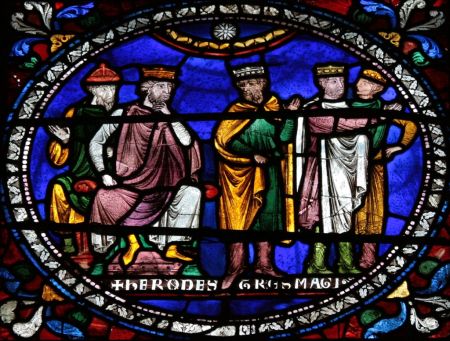
Amid all the beauty of Christmas, it’s easy to forget this sobering truth: Jesus came to shake things up. His birth disturbed those who were wealthy and powerful, and gave hope to those who were poor and meek. Even at the start of things, when Jesus was growing in his mother’s womb, the Holy Spirit proclaimed through Mary, “He has brought down rulers from their thrones but has lifted up the humble” (Luke 1:52).
Herod was as eager as the Magi were to find this babe in swaddling clothes, but for entirely different reasons. Herod wanted to murder him. The Magi wanted to honor him.
These wise men followed his star until it stopped in Bethlehem “over the place where the child was” (Matthew 2:9). Right there. Can’t miss it.
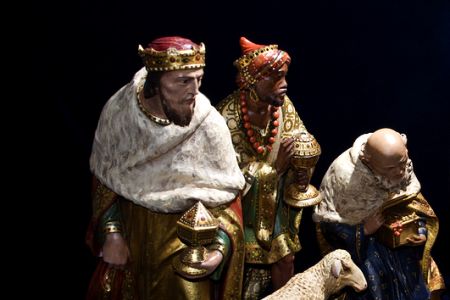
Herod bowed to no one. But these venerable wise men “bowed down and worshiped” (Matthew 2:11) the Holy One.
I’m pierced through as I type these words, letting the truth cut through my pretense. Who or what do I bow to? Who or what do I worship? Is it always the Lord? Or is it also success, however that’s defined? Is it Facebook friends, Twitter followers, best-seller lists? Is it counting numbers, instead of changing lives?
God doesn’t care about numbers. He cares about the attitude of our hearts and the honesty of our words, spoken and unspoken. He is concerned with our motives, and which direction we turn for approval. He wants our undivided attention and utter devotion.
Would I travel a thousand miles to worship his Son, as these Magi did?
Do I give generously, expecting nothing in return?
I don’t like my answers. God is even less impressed.
And yet—oh, beloved, don’t miss this mind-blowing truth—even though he knows all the ways in which we fail him, he loves us still.

I don’t know why, and I can’t explain how, except to say, God is faithful to his Word: “This is love: not that we loved God, but that he loved us”—reliable truth, with undeniable proof—“and sent his Son as an atoning sacrifice for our sins” (1 John 4:10).
He watched his Son die in agony so our sins would not be held against us. In God’s dictionary, this is love defined: not expensive presents under a fragrant fir, or costly gifts laid before a king, but a blameless child nailed to a leafless tree.
We may focus on the manger at Christmas and reserve the cross for Easter, but God had both in mind from the very beginning. Because he loves us. Because he came to earth to rescue us.
The innocent babe in Mary’s arms made all that possible.
Forty days after the Messiah was born, Mary and Joseph traveled to Herod’s Temple in Jerusalem for her purification rites. She offered what the law required—“a pair of doves or two young pigeons” (Luke 2:24)—but her greatest offering was the child she bore, long anticipated by a righteous man named Simeon.
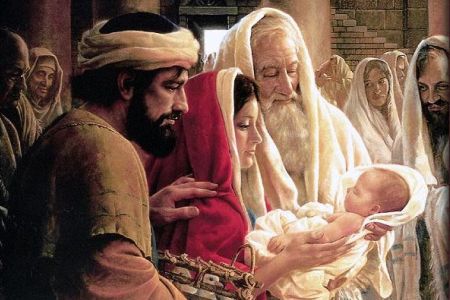
The same Holy Spirit who’d poured prophetic words into Elizabeth and a holy seed into Mary also came upon Simeon (Luke 2:25), revealing that Simeon wouldn’t die until he’d seen the Lord’s Messiah (Luke 2:26), and prompting Simeon to move into the temple courts (Luke 2:27).
One look at the child, and Simeon gathered the boy in his embrace. Trusting of Mary, yes? She’d seen what the Holy Spirit could do, and recognized a kindred soul in this godly man.
Like so many of the main players in our story, Simeon opened his mouth and praised God (Luke 2:28), assuring the Lord he could now die in peace (Luke 2:29).
Again, that nudging of the Holy Spirit inside me. Could I die in peace this very night, having seen firsthand what our loving God can accomplish? Is my hold on this world as light as it should be? Is my gaze utterly fixed on eternity?
I hope so, I hope so, I hope so. Not terribly convincing, is it? Still, I am more aware each day that I’m one step closer to heaven.
Simeon was so certain of what God had in store for him, he could speak difficult truths to Mary without holding back: “And a sword will pierce your own soul too” (Luke 2:35). A word of preparation, rather than warning; spoken out of a longing to comfort, not a desire to wound.
In the same way, as we mature, we have more freedom to speak the words God places on our hearts. We are less worried about what others think of us, and more concerned with following God’s leading.
In the end, the only thing that matters is speaking the truth in love. Which brings us to Anna, our last woman of Christmas. Wait until you meet this sister! I truly have saved the best for last.
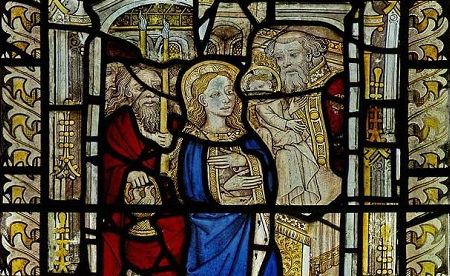
From the Study Guide
Once again the Holy Spirit played a quiet but significant part in the story, revealing to Simeon that he wouldn’t die until he saw the Messiah. Would such knowledge fill you with hopeful anticipation or fearfulness and dread? How can you best prepare for the day you see your Savior face to face?
I know, I know. Who talks about death at Christmastime?! Well, Simeon did, in a matter-of-fact, bring-it-on kind of way. I’m not in any hurry to leave this world, but I am ready. Of course, I’d love if it happened quickly and painlessly. And at least thirty years from now. LOL. But I trust God to know what’s best for me and for those I love.
What really matters is the One who is waiting for us on the other side. “For now we see only a reflection as in a mirror; then we shall see face to face” (1 Corinthians 13:12). Honestly, I get goose bumps just thinking about it. However many years we spend on this earth, they are nothing compared to eternity. Oh, Father, let us be like Simeon, trusting you so completely with our past, present, and future that we can say, “You may now dismissyour servant in peace” (Luke 2:29).
Now it’s your turn
Two questions I hope you’ll consider:
- Was there something in Chapter Seven that spoke to your heart?
- How can you best prepare for the day you see your Savior face to face?
Please respond under Post a Comment below. Your answers are a blessing to me and everyone who reads them.
Look for our final post on The Women of Christmas early on New Year’s Eve. Until then, may your awareness of our Messiah—who he is and why he came—shape the days ahead in unexpected ways.
Your sister, Liz

Beginning January 2014 (SO excited about this!)


